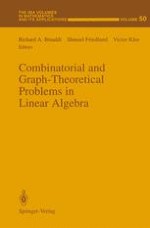1993 | OriginalPaper | Chapter
Mixed Matrices: Irreducibility and Decomposition
Author : Kazuo Murota
Published in: Combinatorial and Graph-Theoretical Problems in Linear Algebra
Publisher: Springer New York
Included in: Professional Book Archive
Activate our intelligent search to find suitable subject content or patents.
Select sections of text to find matching patents with Artificial Intelligence. powered by
Select sections of text to find additional relevant content using AI-assisted search. powered by
This paper surveys mathematical properties of (layered-) mixed matrices with emphasis on irreducibility and block-triangular decomposition. A matrix A is a mixed matrix if A = Q + T, where Q is a “constant” matrix and T is a “generic” matrix (or formal incidence matrix) in the sense that the nonzero entries of T are algebraically independent parameters. A layered mixed (or LM-) matrix is a mixed matrix such that Q and T have disjoint nonzero rows, i.e., no row of A = Q + T has both a nonzero entry from Q and a nonzero entry from T. The irreducibility for an LM-matrix is defined with respect to a natural admissible transformation as an extension of the well-known concept of full indecomposability for a generic matrix. Major results for fully indecomposable generic matrices such as Frobenius’ characterization in terms of the irreducibility of determinant are generalized. As for block-triangularization, the Dulmage-Mendelsohn decomposition is generalized to the combinatorial canonical form (CCF) of an LM-matrix along with the uniqueness and the algorithm. Matroid-theoretic methods are useful for investigating a mixed matrix.
